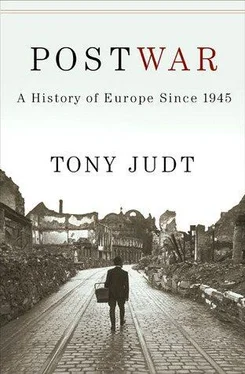Though it was replaced by a newly mythologized version in which Stalin himself—and his crimes—passed half unacknowledged.
The credibility of the Soviet system rested to a quite extraordinary extent upon its capacity to get results from the land. For most of its eighty-year life, agriculture was on an emergency footing in one way or another. This would not have struck an eighteenth-century European or even a twentieth-century African observer as especially unusual; but the Soviet Union was held to rather higher standards of performance.
A year after his release, Sinyavsky emigrated to France and took up a post teaching Russian literature at the Sorbonne. Daniel stayed in Russia, where he died in 1988.
Although the best-known reform economist of the Sixties was a Czech, Ota Sik, it was the Hungarian school that had the broadest influence and the most practical impact.
Djilas was imprisoned for four years when The New Class appeared in the West, and re-incarcerated for a further four years shortly after his release.
Richard Nixon was by no means the last American to be seduced by the Romanian dictator. Impressed by Nicolae Ceauşescu during a visit to Romania in 1978, Senator George McGovern praised him as “among the world’s leading proponents of arms control”; and as late as September 1983, when the awful truth about Ceauşescu’s regime was already widely known, Vice President George Bush memorably described him as “one of Europe’s good Communists.”
The French translation of the Open Letter that circulated in Paris the following year was distributed by Jeunesse Communiste Révolutionnaire , a Trotskyist organization.
Of the approximately 30,000 Jews in mid-Sixties Poland, less than 7,500 belonged to the official Jewish organizations.
In 1966 a Polish-language edition of the anti-Semitic forgery The Protocols of the Elders of Zion was unofficially circulated in Party groups, universities and the army.
Novotný was not the only one afraid of a backlash. On April 5th 1963, the Italian Communist leader Palmiro Togliatti secretly wrote to ask Novotný and his colleagues to delay news of the rehabilitation of Slánský and other trial victims until after the forthcoming Italian elections. As the PCI’s chief well understood, it was not only Czechs who had good cause to be disgusted at their leaders’ collaboration in covering up large-scale judicial murder just ten years before.
In December 1967 Party members constituted 16.9 percent of the Czechoslovak population—the highest share of any Communist state.
Jiří Pelikán, ed., The Czechoslovak Political Trials. The Suppressed Report of the Dubček Government’s Commisson of Inquiry, 1968 (Stanford, 1971), p. 17.
The request was hardly spontaneous. Two weeks earlier—at a secret meeting near Lake Balaton in Hungary hosted by János Kádár—Vasil Bil’ak (one of Dubček’s opponents within the Czechoslovak Party leadership) was advised by Shelest that Moscow would like a ‘letter of invitation’. The ensuing letter refers explicitly to the Party’s ‘loss of control’, the likelihood of a ‘counter-revolutionary coup’ and the ‘risks to socialism’ before inviting Moscow’s ‘intervention and all round assistance’. It ends: ‘we request that you treat our statement with the utmost secrecy, and for that reason we are writing to you, personally, in Russian.’
Because Ceauşescu refused to take part in the invasion or allow Warsaw Pact troops to cross Romanian territory, the Bulgarian contingent had to be airlifted to Ukraine instead. Their presence hardly justified the trouble; but the importance of spreading responsibility for the attack across the largest possible number of fraternal states overrode other considerations.
After 1989 it emerged that the Czech Secret Police in the normalization years had established a special unit to monitor and target the country’s Jews: an echo of Czechoslovakia’s own past as well as contemporary Poland. It had not escaped the authorities’ notice that only one of Dubček’s leading colleagues had refused to sign the Moscow document renouncing his actions. He was František Kriegel—the only Jew in the group.
Milan Šimečka, Obnovení Pořádku ( The Restoration of Order ), (Bratislava, 1984—in samizdat ). Eighty thousand Czechs and Slovaks fled into exile following the Soviet invasion.
The baby-boom generation itself never wanted for employment. It was its immediate successor, the cohort born after 1953, which entered the employment market just as jobs were getting harder to find. Not surprisingly, the politics of the successor generation were markedly different.
Only in Spain, where the cycle of social protest lasted into the mid-Seventies before blending into the movement for a return to parliamentary democracy, did the upheavals of the Sixties herald a genuine political transformation—a story to be taken up in Chapter 16.
Britain’s Profumo Affair of 1963—a deliciously multifaceted scandal of sex, class, drugs, race, politics and spies that absorbed the country for months—would have been unthinkable a few years later. The peccadilloes of a fallen élite might continue to arouse a certain prurient interest, but after the Sixties they could no longer shock .
The US federal budget deficit grew from $1.6 billion in 1965 to $25.2 billion in 1968.
As a point of comparison American oil imports, at the height of the 1973 crisis, represented no more than 36 percent of US domestic consumption.
An average, of course, is just an average. In the particularly bleak year of 1976, when British unemployment passed one million for the first time since the war and annual inflation approached 25 percent, rates of growth everywhere hit a low point—in Italy the national economy actually shrank, for the first time since the war.
National Association of Local Government Officers; National Union of Public Employees; Association of Scientific, Technical and Managerial Staffs.
This acronym had a distinct political use: by reviving the name of an eighteenth-century French silver coin it helped assuage Parisian discomfort at having to acknowledge West Germany’s emerging primacy in the affairs of Europe.
Quoted in Harold James, International Monetary Cooperation since Bretton Woods (NY, Oxford, 1996), p. 180.
Most notoriously on October 17th 1961, when the French police murdered an estimated two hundred Algerians, many of them drowned in the Seine, following a protest march through Paris. The Chief of Police at the time was Maurice Papon, later indicted and found guilty of crimes against humanity for his collaboration in the wartime rounding up and despatch of French Jews to Auschwitz. See Epilogue.
The Provisionals took their name from the April 24th 1916 declaration in Dublin, when the insurrectionists proclaimed a provisional government.
Читать дальше












